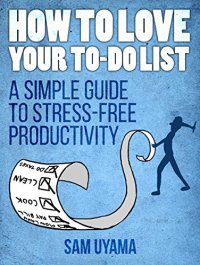
Free on 22nd - 24th Jun 16
![]()
or borrow free on Kindle Unlimited.
Also Available as:
Print Edition
Watch the book trailer:
www.youtube.com/watch?v=Dtbtoat05IQ
How To Get More Done Without Killing Yourself
Are you constantly unable to complete everything that you need to do? Maybe you feel like your life is a series of reactions to whatever happens to you. I’ve felt like that and I don’t like it; I don’t think anyone does.
“How To Love Your To Do List” is for those who are looking for a practical system to increase their performance while decreasing their stress.
This book isn’t one-size-fits-all, and it isn’t about having the perfect day planner. It’s about how to create a system you can pick apart and customize exactly how you see fit.
This book will help you:
o Create a to-do system that will allow you to dramatically increase your productivity with minimal stress
o Understand why people struggle with to-do lists
o Break down the 3 components of productivity and utilize them to your advantage
o Create habits for winning with to-do lists
o Learn what mistakes people make with their lists
As well as learn:
o How to make a Tickler File in Evernote
o How to throw away all your receipts with Scannable
o How to eliminate unnecessary emails forever
o How to stop getting credit card offers in the mail
Things you’ll get:
o Templates for organizing your life with Evernote
o Specific action steps to take at the end of each section
o Tools I use to plan my week
o Cheat Sheet book summary
Excerpt from the book
Other Best Practices:
–Understand Willpower Depletion. Each of us has a finite amount of willpower each day. As the day goes on your willpower gets depleted, making it harder to do the next thing on your list.
In his book, “The Power of Habit“, Charles Duhigg talks about something called the Hot/Cold Empathy Gap. This explains the struggle people have with New Year’s Resolutions. People make commitments when they’re “Hot” (inspired/motivated) and fail to take into consideration how they’ll feel when they’re “Cold” (tired & overwhelmed). This happens every day with to-do lists as well. You’ll make a plan to complete all the tasks on your list with every intention of following through to the end. But little by little you wear yourself out and struggle to maintain your resolve.
There are two things you can do when it comes to this:
1. Use If/Then Scenarios
If/Then scenarios are powerful for creating habits (“If” can also be read as “When”). You’ll have a specific plan for when you’ll do a practice and a fallback plan for if things go south.
“When I wake up then I’ll drink 1 cup of water.”
“If I’m too tired to go to the gym then I’ll do 15 minutes of stretching at home.”
2. Do less
Do you feel overcommitted? Change your commitment. No need to make yourself a martyr. Evaluate the commitment and see if it’s something you genuinely want right now. If it’s a commitment to yourself, say “I change my commitment!” If it’s a commitment that involves other people, then you can send them a nice email or text explaining reasons.
Commitments we make but don’t act on are the “open-ends” we talked about earlier. They’re the cause of the majority of people’s stress. You make commitments to others you can’t always follow through on and you’ve likely made commitments to yourself that you’re not even aware of. “Eat healthier” and “clean garage” are a couple of examples.
–Schedule Everything. What gets scheduled gets done. Harvard Business Review calls this “living i






